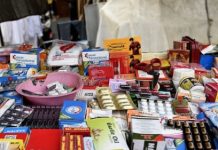(Excerpts from “MY LIFE AND PHARMANEWS” by Sir Ifeanyi Atueyi)
It was Victor Hugo, the iconic French writer, who once said, “All the armies of the world cannot resist an idea whose time has come.” One immediately gets a good understanding and appreciation of Hugo’s message here as one considers the chain of events leading to the birth of a child that has completed its period of gestation in the womb.
From what I have read, two schools of thought exist among medical scientists and researchers as to who, between the mother and the child, triggers the onset of labour. There are those who believe that it is the mother’s body that signals to the baby that its “residency” period is over, while others believe it is the baby that actually tells the mother that it is mature enough to face the outside world.

Regardless of anyone’s position on the matter, however, one of two questions must arise: What makes the same body of the mother that had patiently harboured and cared for a baby throughout the gestation period to suddenly decide that it no longer wants to continue housing it?
Or, on the other hand, we may ask, what makes a baby that has comfortably stayed in the womb for nine months to suddenly decide that it desperately wants to be out of it? The answer we will get to both questions is the same. The appointed time has come – and nothing on earth can stop it.
And so it was with Pharmanews. The sequence of events that led to its birth was so sudden and so extraordinary that, till today, there are still questions surrounding it that even I cannot answer. The only conclusion I can satisfy myself with is that God must have purposed that it was time for it and, thus, everything else must begin to work towards its actualisation without delay.
The “labour contractions” for the birth of Pharmanews, as I termed it in the previous chapter, actually began in 1978, when I decided to resign as the editor-in-chief of the PSN journal. Well, as much as one may be astonished by this decision of mine – considering how passionate I had been for the publication – I believe that this astonishment will be sufficiently tempered by the preamble I already provided at the beginning of this chapter, as to the wonders preceding the birth of an idea or of a child.

Sincerely, I cannot pinpoint any cogent reason for taking the decision to resign as the editor-in-chief of the Nigerian Pharmacy Journal. To start with, there was no limit to my tenure, unlike the positions of the President and National Secretary that spanned three years. Therefore, after having served under Pharm. Chris Efobi, as president, from 1974 to 1977, I continued under Chief Ayo Fasanmi.
Secondly, and more importantly, this was an engagement that had given me joy and satisfaction since I took it up. In fact, as I have said earlier, it had become such a pivotal part of me that I took the journal practically everywhere. But then, out of the blues, I took the decision to quit – much to the consternation of the entire PSN leadership. No one thought I could do without editing the journal, since I appeared to be addicted to it.
Chief Fasanmi was, expectedly, the most rattled by my unexpected decision. Indeed, so flabbergasted was he that he initially took it as a practical joke or more precisely a whimsical urge that would soon fade away as mysteriously as it had come. When he saw that I was serious, however, he tried to persuade me to reconsider the decision but I couldn’t be persuaded. The Deputy President, Lawrence Anyafulu, also pleaded with me, but I remained unmoved – something quite unusual of me.
Stronger Contractions
Shortly after, in my place of work, a greater storm began to gather. I already mentioned that it was Pharm. Ralph Mbagwu (RM), the manager of the pharmaceutical department of R.T. Briscoe Pharmaceuticals, who had specifically invited me to join the company because he believed in my ability to stabilise the department which had been experiencing a high turnover of pharmacists.
And as I mentioned in the previous chapter, under him, I was able to attend various programmes of the Nigerian Institute of Management (NIM) on sales, marketing, accounting and general management.
As time went on, however, I observed that he refused to give me the opportunity of visiting our overseas principals in Denmark, Sweden, France, Italy and USA. Interestingly, on a number of occasions, he mentioned that I might visit Norwich Pharmaceuticals Inc. in New York. In fact, Pharm. Bade Adeniji, the national sales manager, used to joke with me on RM’s promise of going to Norwich. Occasionally, RM would say, “Ifeanyi, if it becomes necessary, you just hop into the plane and go to New York.”
Before now, I hadn’t paid much attention to these shenanigans of my boss, but in this year, 1978, which had already begun to prove to be a momentous year in my life, things took a totally different turn. A friend and colleague of mine, Douglas Egbuonu, who was the marketing manager of Pfizer Products Ltd, introduced to me a six-week training programme on marketing management of the International Marketing Institute (IMI) in Cambridge, Massachusetts, USA. Douglas spoke highly of the potential benefits of this programme and I soon developed a great deal of interest in it.
Two other considerations fired up my interest in this programme. One was that I considered it a good opportunity for me to visit the US for the first time, having always known it as “God’s own country”. The other was that I saw it as a good opportunity to visit Norwich in New York, which RM had often promised me.
So, without hesitation, I went ahead to apply for the course, which was to hold between June and July, and I received a reply that I had been accepted. What was left for me, therefore, was to meet the huge financial obligations, which comprised tuition and boarding expenses, as well as my flight ticket.
The question that should naturally spring up in anyone’s mind is, why did I apply for a programme that was going to cost so much without having any means of financing it? (Such overseas courses were usually sponsored by the employer).
All I can say in hindsight is that I was merely being propelled – and the very next step I took clearly confirms this. In a rather strange move, I wrote back to the organisers of the programme that I had no money to pay the tuition and needed their support. I wrote several letters, until I received a positive response that the institute had waived the tuition for me, which greatly gladdened me.
Then I did something unusual. I wrote again to the institute to appreciate the grant for my tuition and also asked that my boarding expenses be granted also. After several desperate reminders, this request was also granted. I wrote so many letters that when I eventually met Ms Carole Samworth, the registrar, personally, she confessed to me that nobody had bombarded her with so many letters as I did.
It was at this point that I presented my plan to my boss, making sure to emphasise that all expenses had been taken care of, except for my ticket and that it was an opportunity to visit Norwich in New York. What I needed from the company was the air ticket and time. However, for reasons which I could not understand, my boss wasn’t willing to let me go for the course. He told me the company didn’t have the money for my fare.
Failed Pacifiers
I eventually purchased the KLM ticket for Lagos-Amsterdam-Boston-Amsterdam–Lagos, which cost me N560.00 at that time. The same ticket costs about N700, 000.00 today. Thereafter, I went back to my boss to inform him that I had procured my ticket and I only needed time off. His response again was in the negative. He told me that the time that I proposed to be away would be unfavourable for the company due to pressure of work.
Failed Pacifiers
Since it wasn’t natural for me to have a confrontation with my superior, I decided to take some congenial steps to make my boss grant me permission to attend the programme. The first step was to appeal to him to convert the period I would be absent to my annual leave, which was four weeks, and the remaining two weeks deducted from my leave for 1979. My boss again rejected my plea, saying that I wasn’t entitled to go on leave until October.
The next step I took was to reach out to a relative of my boss who was in another department of our company. I explained my predicament to him and requested him to persuade my boss to grant me permission to attend the programme. After some days, I received a letter from the company, saying my request had been granted and that I was free to attend the programme without bothering about the additional two weeks.
With heartfelt gratitude for this breakthrough, I was soon on my way to the venue of the marketing training.
The Final Straw
My trip to the United States turned out to be a worthwhile experience in every way. Not only did the training prove to be thoroughly enlightening and empowering, I also had a great time visiting relations and friends. The period gave me the opportunity to travel with Christopher Erinne (a much younger brother of the late Daniel Erinne) for the wedding of his elder brother, Edwin, in Mississippi. When it was time for me to return to Nigeria, I was filled with a deep feeling of renewal and rejuvenation, as well as a heightened understanding of the dynamics of effective and strategic marketing.
When I eventually presented myself at R.T. Briscoe, I was greeted with palpable excitement by virtually all the staff, but not so with my boss. It then became obvious to me that our relationship was no longer cordial.
Indeed, to describe my experience following my return from the overseas training as an anti-climax would be an understatement. As I mentioned above, with the comprehensive exposure I had received from the training, I had felt a reawakening within me in all areas of marketing – and I had been so eager to begin to implement the ideas that I had acquired to advance my performance. But the environment was no longer conducive. And so, instead of bustling about, executing ideas and strategies, I found myself in one of the darkest moments of my life. Thus, what should have become a period of accomplishments for me became a period of confusion and depression.
(Continues next edition)














generic tadalafil united states: http://tadalafilonline20.com/ tadalafil 60 mg for sale
online tadalafil – tadalafil professional tadalafil pill
Nicely presented and organized content
Introducing
9japrime ⇑ #1 Nigeria Social Network | Best FaceBook (FB) Alternativea#1 Nigeria Social Network | Best FaceBook (FB) Alternative 9japrime! You Earn on 9japrime to Discover new people, create new connections and make new friends across Nigeria and Nigeria Institutions. Create Your 9japrime Account for FREE
Nice, Congrats to pharmanews and more grease to there development.
Wow
Next pls